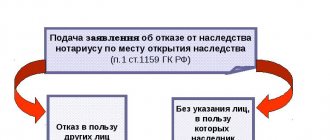The cost of a marriage contract, which must be notarized, is the sum of two prices:
- Notarial tariff or, in other words, notarial state duty, the amount of which is established by law, namely the Tax Code of the Russian Federation. This is money that goes to the state from each marriage agreement concluded. Currently the tariff is 500 rubles.
- Services of technical and legal nature. This is the price that the notary sets independently for registration and certification of the marriage contract in addition to the state duty required by law.
Keep in mind that, according to the law, a marriage contract should not be subject to state registration, such as transactions with vehicles or real estate, therefore, for its validity, a notary’s certification will be sufficient.
Contents of the marriage contract
What can and cannot be stated in marriage contracts is specified in Art. 42 of the Family Code of the Russian Federation.
A prenuptial agreement is necessary if you need to change the regime of joint ownership of husband and wife provided for by family law.
By default, property acquired by spouses from their income during marriage is considered the joint property of husband and wife, and it is this property that will be divided between them in the event of a divorce. And it doesn’t matter which of them it is recorded on.
Therefore, if the property regime established by law for spouses suits you, you do not need to draw up or sign any agreements.
In a marriage contract, you can establish a regime of joint ownership, a regime of shared ownership or a regime of separate ownership of your choice, both for the entire property of both partners and for certain things.
In this agreement, it is possible to define the property rights and obligations of the partners both regarding those things that they already have and the things that they will receive in the future.
In addition, the husband and wife can establish the rights and obligations regarding financial support for each other, the amount and for what expenses for family needs each partner is responsible, and also fix what property will go to which of them in the event of a divorce.
It is important to note that Russian family law does not provide a closed list of what can be enshrined in this agreement. In fact, these can be any conditions governing the property relations of husband and wife that do not contradict the law.
The husband and wife also have the right to fix the terms of validity of the conditions enshrined in the marriage contract, or to make the provisions of the contract dependent on the occurrence (non-occurrence) of specific events.
Russian family legislation does not allow the following provisions to be recorded in marriage contracts:
(1) limiting the legal capacity or capacity of the parties;
(2) restriction of the parties’ right to protect their interests in court;
(3) restriction of the right of a disabled partner in need to collect alimony;
(4) personal non-property relations between the parties (i.e., a prohibition on treason or the obligation to wash the dishes cannot be established);
(5) rights and obligations regarding joint children;
(6) provisions that place the husband or wife at a severe disadvantage;
(7) provisions that differ in meaning from the basic principles of Russian family law.
Requirements for different banks
The requirements for a marriage contract in different banks are approximately the same, since they are regulated by civil and family law.
But for banks, it is more profitable for one of the spouses to be the borrower, and they often diligently insist on obtaining a mortgage for the husband or wife. The important point here is to comply with the provisions on non-infringement of the rights of one of the spouses and the norms of the law in general.
Many banks in Russia, for example, when signing a contract, enroll the spouse as a co-borrower, thereby determining his right to housing and responsibility for timely repayment. Such conditions are practiced by Sberbank, Rosselkhozbank and many others. The contract forms are also approximately the same. If you take the form offered by Sberbank, then you can freely use it for lending at another bank, just change the name and details of the parties.
Form and cost of drawing up a marriage contract
The law clearly regulates the form of concluding a marriage contract. A marriage contract is drawn up in simple written form. A special feature of the design is that it must then be subject to notarization.
In order to draw up a marriage contract, you can contact a notary, who will offer to use the contract forms he has. You can also draw up a marriage contract without a notary by contacting a family lawyer, or do it yourself.
The question often arises of how much the services of a notary and the services of a lawyer in family matters cost. Indeed, there is no single tariff for drawing up this contract.
The cost of this service depends on:
(1) difficulties in drawing up an agreement (what conditions the spouses want to stipulate in it);
(2) the amount of property and documents confirming the rights to it;
(3) the urgency of drawing up the contract.
In this situation, you choose who to pay for this service: a notary or a lawyer. However, I would like to draw attention to the fact that the notary’s task is still to certify the marriage contract, that is, those specific conditions that the spouses agreed on. And if you need full legal advice on the possibilities of marriage contracts or assistance in negotiating with your partner, it is better to contact a lawyer to draw up a contract, and then have it notarized.
Notaries, as a rule, offer existing standard forms of agreement and do not seek to deviate from them, not adapting to the requests of the contracting parties, but rather the opposite - trying to limit them to the framework of the existing form, which, however, is not bad if we are talking about the simplest conditions , for example, a simple division of all property 50% to 50%, however, for more complex cases, the agreement will most likely have to be finalized independently or with the help of a lawyer.
Remember: in order for a notary to certify your contract, you must pay a state fee of 500 rubles. You will also need to pay for the legal and technical services of a notary (checking your contract for compliance with the law and preparing the marriage contract on a special form).
Privileges
In accordance with Article 333.38 of the Tax Code, some citizens are fully or partially exempt from paying state taxes.
These include:
- disabled people I and II in the amount of 50% of the established amount
- public organizations of disabled people
- government departments
It should be taken into account that state duty benefits do not apply to the cost of other services provided by a specialist.
Similarities and differences between a marriage contract and an agreement on the division of property
Unlike a marriage contract, an agreement on the division of property can be signed at any time during the marriage, as well as after a divorce, that is, the agreement can be signed not only by spouses, but also by former spouses.
In terms of the form of conclusion, these agreements are completely identical: they are drawn up in writing and then certified by a notary.
As for the property regimes that can be enshrined in them, there are significant differences. The agreement can prescribe a regime of common shared ownership or a regime of separate property; a marriage contract can also establish a regime of common joint ownership.
In addition, an agreement on the division of property can establish rights and obligations only in relation to the property that the partners already have at the time of its conclusion. The possibilities of a marriage contract are broader: it is possible to regulate property rights and obligations in relation to property that the husband and wife will acquire sometime in the future. Thus, a frequently used condition is the following: “all movable and immovable property that will be acquired during marriage will be considered the property of the spouse in whose name it is acquired.” In a marriage contract, you can also change the regime of personal ownership of property that was received by the husband or wife before marriage to another regime of ownership, for example, to the regime of common joint property.
Remember that none of these agreements can regulate the maintenance and upbringing of children.
How is the mortgage on an apartment purchased during marriage repaid?
If the spouses divorce, they continue to make mortgage payments according to the current cooperation schedule with the bank. According to the Family Code, the second spouse is always included in the mortgage agreement as a co-borrower.
The procedure for payments during divorce can be varied:
- With shared ownership, spouses pay the mortgage in proportion to their shares and divide the property after repaying the loan in the same shares;
- If the property under the marriage contract is established as separate, then only one spouse continues to pay the mortgage;
- If the property is shared, then both spouses continue to make payments, or one if the other refuses to do so.
One way or another, the bank doesn’t care who exactly will pay off the mortgage payments. The main thing is that they arrive on time and in full.
Change and termination of the marriage contract
In view of the general principle of freedom of contract, the husband and wife have the right to change the provisions of the marriage contract, as well as to terminate it altogether at any time during the marriage. In this case, there is only one rule: all these actions must be performed by mutual consent and in the same form in which the agreement was originally concluded.
If it was not possible to reach a consensus with your partner, you can change or terminate the marriage contract in court as part of a civil process.
In the event of a divorce, the provisions of the contract that determined the property relations during the marriage cease to apply, and the provisions governing property rights and obligations after the divorce continue to apply.
Do I need to obtain the bank's consent?
Conclusion of a contract is voluntary. The bank will not require its registration from borrowers. But at the same time, the loan may be denied, and the only option for obtaining a positive response to the application will be a marriage contract, which will allow one to bypass the weaknesses of the family as a borrower.
If an agreement is not required to obtain a mortgage from a bank, but was concluded earlier or is being drawn up by spouses for some other purpose, the bank must be notified and give permission for it. Since the provisions of the marriage contract may affect the mortgage and conflict with its terms, infringe on the rights of one of the parties, reduce the reliability and guarantee of payment for the loan, and also require the re-registration of existing property rights.
When mentioning mortgage housing when drawing up the marriage contract itself, it is necessary to provide the bank’s consent to its preparation. Without it, the contract may be declared invalid.
Important! The bank always asks clients for information about the presence or absence of a marriage contract when applying for a loan. If the borrowers conceal this and the information is revealed in the future, the bank will have the right to demand early repayment.
Challenging marriage contracts in court
(1) Determination of the grounds for invalidating a marriage contract
A marriage contract (or its individual provisions) is void if:
- the contract was not notarized;
- at least one of the spouses entering into marriage has been declared legally incompetent;
- the marriage contract was a sham transaction, that is, it was concluded to hide another transaction;
- the marriage contract was an imaginary transaction, that is, it was concluded without the desire of the consequences of the marriage contract on the part of at least one of the persons entering into marriage or spouses;
- contains illegal restrictions for those entering into marriage or spouses, for example, the right to protect their interests in court.
A marriage contract (or its individual provisions) is voidable if:
- at least one of the spouses entering into marriage was recognized as having limited legal capacity;
- at least one of the spouses was unable to understand the meaning of their actions or manage them;
- at least one of the spouses entering into marriage entered into a marriage contract under the influence of deception, threat, violence, etc.;
- if the marriage contract contains provisions that place one of the parties to be married or the spouses in extremely unfavorable circumstances.
(2) Determination of the limitation period
If you assume that your prenuptial agreement is a void transaction, then the statute of limitations is 3 years, and if it is a voidable transaction, 1 year.
The limitation period for a party to a void transaction begins from the day when execution began, and for a party to a voidable transaction - from the moment threats cease, violence is committed, etc., or when the party learned or should have learned about the circumstances that are the causes declaring the transaction invalid.
It is important to pay attention to the fact that even if the statute of limitations has passed, you can still file a claim in defense of your rights and the court will accept it for consideration. And only if the other party declares that the statute of limitations has expired will the judge refuse to satisfy the claim.
(3) Drawing up a statement of claim and paying state fees
The statement of claim must indicate the following:
- information about the plaintiff and defendant;
- an explanation of what rights have been violated and why;
- circumstances that are the basis for recognizing a marriage contract as void or voidable;
- the very requirement to recognize the marriage contract as void or voidable and to apply the consequences of this recognition;
The following documents must be submitted along with the claim:
- documents proving your position;
- notification of delivery of a copy of the statement of claim and documents (evidence) that the other party does not have;
- a document confirming payment of the state duty;
- a copy of the power of attorney for the representative, if available.
(4) Filing a claim in court and litigation
As a rule, claims are filed at the defendant's registered address. Then you need to find out the date and time of the court hearing and take part in it (or send a lawyer representative in your place).
After completion of the trial, you must wait until the period for appeal has expired (1 month) and receive a copy of the court decision certified by the court.
To watch a video about a marriage contract, follow the link.









